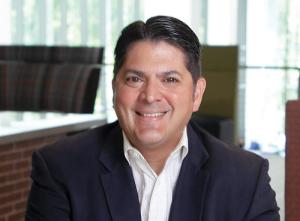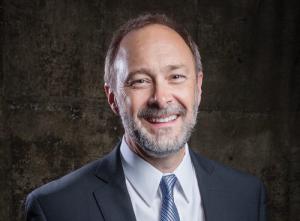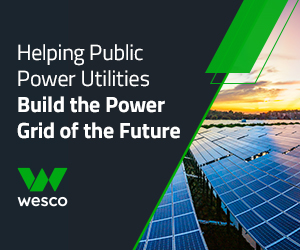CPS Energy, Tri-State G&T
Rudy Garza is the CEO of CPS Energy. Duane Highley is the CEO of Tri-State G&T. Clint Vince is Dentons US Energy Practice Chair.
Cooperative power and public power are massively important, serving many customers and producing a lot of power in the U.S. That makes them also part of the movement on environmental, social, and governance.

To find out where public power is on the issues, Public Utilities Fortnightly turned to CPS Energy, the nation's largest municipally owned combined energy utility providing natural gas and electric service to over a million consumers in the growing City of San Antonio. PUF also turned to Tri-State Generation and Transmission Association, a cooperative power supplier made up of forty-five members, including forty-two electric distribution cooperatives and public power districts serving over a million electric consumers.
Here you will find conversations with CEOs Rudy Garza of CPS Energy and Duane Highley of Tri-State G&T. Moderated by Dentons' Clint Vince. Listen in as they talk about the latest on ESG in their large service territories.
Clint Vince: Talk about Tri-State and then elaborate on why ESG, environmental, social, governance issues are of importance to Tri-State.
Duane Highley: Tri-State is an oddly named cooperative that serves in four states. We're member owned and supply power to forty-two utility members across the panhandle of Nebraska, Colorado, Wyoming, and New Mexico. A big swath of the west.
 Rudy Garza: Natural gas for CPS Energy will always be part of the mix. We are moving away from coal. Our board will make that decision, because our community has placed that expectation on us. I don’t get to do what I do if I can’t keep the lights on.
Rudy Garza: Natural gas for CPS Energy will always be part of the mix. We are moving away from coal. Our board will make that decision, because our community has placed that expectation on us. I don’t get to do what I do if I can’t keep the lights on.
We're cooperatives that serve remote areas and are governed and owned by our consumer-members, so ESG is built into co-ops' DNA. We've always responded to the needs and desires of our members because those are our owners. Those are our shareholders, so to speak.
At our board meetings, forty-two democratically elected representatives of their local electric cooperative come together and sit face to face with me and our staff and hold us accountable for important issues, which often fall in the category of ESG.
We talk about supporting our communities, employees, and the environment. Our mission statement's simple: reliable, affordable, responsible. Reliability is one of the most important things we can do for society in keeping the lights on and keeping people safe.
If the power goes off, people die, and business costs skyrocket. As a co-op, we've always been focused on this, so it was easy for us to write an ESG report and document what we were doing.
 Duane Highley: Wyoming and Nebraska see energy futures a lot different than Colorado and New Mexico. Yet, around our board table, we reach agreement. This has been a member-driven initiative because we all agree on reliability and affordability.
Duane Highley: Wyoming and Nebraska see energy futures a lot different than Colorado and New Mexico. Yet, around our board table, we reach agreement. This has been a member-driven initiative because we all agree on reliability and affordability.
Clint Vince: Is it true Tri-State was one of the first major generation and transmission co-ops to develop an ESG policy?
Duane Highley: The insurers and lenders have told us we're one of the first, if not the first large G&T, to have an ESG policy, formalized and written. Part of what's important for our policy is the movement we're making toward green energy, a rapid shift for a G&T cooperative.
We're moving at light speed for a co-op, which is maybe not as fast as other businesses, but utilities don't move fast because we're focused on preserving reliability. That's our number one goal.
We'll be at fifty percent clean energy consumed across all four states in which we serve by 2025. By the end of the decade, we'll be at seventy percent clean energy used across all four states.
By 2030, we'll have reached an eighty percent decarbonization within the State of Colorado for energy delivered relative to a 2005 baseline. We're making rapid strides, while keeping the lights on, prices reasonable, and with a recent wholesale rate decrease.
Clint Vince: I noticed that the Rocky Mountain Institute, which at times was critical of Tri-State, has become a strong supporter of initiatives you've mentioned. Are there other highlights you would like to emphasize?
Duane Highley: The Rocky Mountain Institute sat down with us in 2019 when we were developing what we called our Responsible Energy Plan. That included our green-energy transition and support for communities in transition, such as formerly coal-dependent communities, communities with coal mines, and coal plants.
The Institute helped us put together a proposal, which passed in the Inflation Reduction Act, to provide 9.7 billion dollars for cooperatives to help accelerate that transition for our members.
Partnering with the Rocky Mountain Institute, Sierra Club, and others who don't normally partner together, we then worked together to make lives better and help our rural communities.
Our transition efforts include reinvesting in areas that are going to lose jobs, putting renewable energy projects in communities to help restore the tax base that's lost when the plant retires. Then we're actively pursuing research projects that can be complementary to the skill set of workers being displaced.
Coal plant workers don't want to go from being pipefitters and millwrights to being coders. They want to continue to use that skill set they have.
Clint Vince: Rudy, CPS Energy is the largest municipally owned, combined electric and gas system in the country.
Rudy Garza: That's correct. We are the largest combined electric and gas utility. LA is bigger than us on the electric side, and Philly's bigger on the gas side. But combined, we're the largest, and similar in approach to co-ops.
We are the utility closest to our customers that has to be responsive to the expectations and needs that our local community expects of us. The ESG conversation amounts to, are we listening to what our community's telling us they expect and how they're going to determine what good looks like in terms of the service we're providing? We were ESG before ESG came along.
We were early adopters of wind in the early nineties as wind proliferated in the State of Texas. We're one of the highest producers of wind power in the country; CPS Energy is number two. And we're one of the largest purchasers of wind power for any municipal utility across the country.
We have over a gigawatt of solar production under contract, and we've got about six hundred fifty megawatts in our portfolio currently. We will be over a gigawatt in the next three, four years or so.
We've got one of the highest bond ratings in our industry, and we're providing energy in an affordable manner. This is good business, and it's how our paper will be graded when they decide whether or not CPS Energy is providing the right kind of value to our customers.
Clint Vince: Is it correct you are now the number one user of solar power in the State of Texas for a utility?
Rudy Garza: Yes. We're number one in solar in Texas, and we're number five across the country. I will take solar power over wind, because when it's hot and our customers are using energy, solar is producing.
We're doing a lot of work on the battery storage front, because if I can extend the availability of the solar generated electrons into seven, eight, or nine o'clock at night, when it's still hot in Texas, that is a benefit to our community.
That makes our solar capacity more valuable. The years ahead are going to be exciting in terms of how we take what is intermittent power and try to transition it into a dispatchable resource through the use of storage technology.
Clint Vince: Duane's co-op is owned by members, and you're municipally owned and represent the consumers of San Antonio. Has there been any controversy as you moved forward with these projects?
Rudy Garza: We have been responsive to our community. Texas has invested eight billion dollars in a transmission super-highway out of west Texas to get wind to the market.
The driver was looking for new royalty opportunities for rural Texas. We've all been in west Texas and seen the windmills. It was an economic development opportunity for rural Texas that wasn't seeing oil and gas royalties.
As we're moving into additional solar, there are probably twenty thousand megawatts in the State of Texas on ERCOT's planning horizon. As more renewables, in addition to solar and wind come online, Texas is starting to consider how to make sure it's got dispatchable resources.
Dispatchable resources are needed to complement the renewable resources and ensure the market works. Texas needs every single megawatt of capacity, as it sits on an island.
There are starting to be conversations about what that all means for the natural gas industry in the State of Texas. Is ESG a means for those who are environmentally minded to move away from oil and gas?
The reality is for public power, we have to keep everything in balance. We've got to do as much renewables as we can, which allows us to operationally meet the needs of our customers, in addition to ensuring we're investing in dispatchable resources.
Natural gas for CPS Energy will always continue to be part of the mix. We are moving away from coal. Our board will make that decision in the near future, because our community has placed that expectation on us. I don't get to do what I do if I can't keep the lights on.
I've got to keep it all in balance and ensure that as wind and solar may not be available, that we've got something to back that up. We've got a good strategy. We're working with our community and through a thoughtful generation planning process to determine what the right mix is for San Antonio and for CPS Energy.
A conversation has started in Texas about whether or not ESG is another socially woke strategy to move away from oil and gas. I don't particularly like phrases such as, socially woke. Everybody's entitled to their opinion. We take all the opinions we can get from our customers and put those into a plan that reflects community expectations.
I don't believe ESG is going to drive us into an imbalance. It's my job as CEO of this organization to ensure we keep all these policy drivers in balance.
Clint Vince: Duane, what would you add?
Duane Highley: When Rudy spoke about the woke agenda, unfortunately, ESG is becoming a political subject and it shouldn't have ever been. Once you give something a label, then people can target it and divide people based on it.
That's never been the issue here as a co-op. I mentioned our mission statement, reliable, affordable, responsible. That's about the same as ESG. I mean responsible to our employees, communities, and environment.
But the way we got support around our board table because they ask, "What's this you're doing? I've heard about this ESG stuff, and that's not good," is we've got four states that represent diverse viewpoints on energy. Wyoming and Nebraska see energy futures a lot different than Colorado and New Mexico.
Yet, around our board table, we reach agreement. This has been a member-driven initiative from the beginning, because we all agree on reliability and affordability. We worked to reduce costs, while taking advantage of lower prices from wind and solar that we've been blessed with in abundance and had a rate decrease.
I'm expecting a rate increase, by the way, in 2024, as gas prices skyrocket. For now, we're in a great spot. It's unusual for any utility executive to say the words, rate decrease. But it did happen.
Clint Vince: Duane, in terms of reliability, you had amazing results during Winter Storm Uri, which slammed just about everybody.
Duane Highley: Fuel diversity is important. Even as we make this energy transition, we have to keep some dispatchable or fossil fuels in the mix for things like Storm Uri.
The example I give is one of our neighboring utilities that's a bit bigger than us, but we back up to each other. During that five-day event, they had more than half a billion in excess cost because natural gas prices skyrocketed, just to keep the lights on. They did keep the lights on as we did, but we spent around eleven million during that same period, in large part because we had fuel oil, and dual fuel combustion turbines.
When natural gas prices went to a hundred times normal, we started up the oil burners and saved our members hundreds of millions of dollars of cost and kept the lights on. We have a lot of wind, and a lot of solar. But during those five days, these resources were often unavailable, or output was significantly reduced.
We can get to eighty percent decarbonization, but for those days when the wind isn't blowing, you've got to have something you can rely on. It's not going to be a three-hour, four-hour battery. It's something that can run for four or five days. Today, that's still gas and oil.
Clint Vince: What does ESG mean to you personally?
Rudy Garza: As a leader of an organization, three thousand employees strong, we bring in three billion in revenue annually, with thirteen billion dollars in assets, so I want to do the best job I can for my community.
I want to do that in an accountable, transparent, and collaborative manner. Our annual report, we've started to transition that into a report that defines what we believe is the value we provide to the community.
I don't care whether you call it ESG. What I do care about is when you start labeling it as some agenda, that becomes a target for the extreme right or left.
I've got the responsibility for my community to ensure reliability in energy supply for my customers. I'm going to do that in the way they tell me they expect me to do that. I'm trying to take all the elements of a complex business into account.
The world is changing. The utility CPS Energy was yesterday, is not the utility we are today. It's not the utility our customers expect us to be in the future.
We have one of the lowest income communities in the country. Sixty percent of my customers are low to moderate income in San Antonio.
I've got a hundred and fifty thousand customers that are close to two hundred million dollars behind on their bills. I've got a number of customers whose utility burden is over ten percent, some as high as thirty percent.
That means the discretionary income they have available to pay their utility bills is thirty percent, when you and I probably are in the three- to five-, six-percent range. As a leader of the utility, it's unacceptable that there are members of my community that face those kinds of challenges paying their utility bills.
From a social perspective, I've got to be thinking how to develop rates, programs, and assistance that are going to help the people who need the most help. I'd like to treat everybody the same and by rates we treat everybody the same. But in terms of putting together creative assistance programs, I've got to be thinking about those issues. That's a social issue for San Antonio.
I've got to do it more socially equitably. I've got to ensure that the governance of my utility factors into what our community thinks about the job we do. ESG is about what the bondholders I'm asking to invest in CPS Energy think about the job we're doing and what my community thinks about the job we're doing.
Duane Highley: Two things come to mind. My first day on the job as an engineer working for an electric co-op, Associated Electric Cooperative, Springfield, Missouri. My boss set me down and said, "Your job is to keep the lights on and to find a way to save money every day because the people you're working for are struggling to pay their utility bill."
He said, "I want you to imagine your grandmother struggling to pay for her medicine, and here comes the electric bill. That's what I want you to think about every day when you do your job. If you're not saving this company at least a million dollars a year every year, we're going to find a different person next year who can." There was an implied threat.
But also, inspiration. We serve some of the most persistent poverty counties in this country. Our members' service areas are super sparse. Some of our co-ops have three customers per mile line. Some have one customer per mile line.
ESG, to me, is helping those people. When we drive across our members' service areas and see folks, it's not all downtown Denver and affluence. It's a lot of people who are struggling to make ends meet. It's all the more important to do what we can to help.
It doesn't end at keeping the lights on and making power affordable. It's helping a community that's losing jobs because the plant's going to close. These were the best jobs. Everybody wanted to work at the plant.
We've got to work together with others to help put jobs there that keep people working in the way they've been working. That's the mission for us. That's what ESG means to me. Help those people. I look them in the eye every month when they come into our boardroom.
Clint Vince: If there were one sentence you wanted to communicate to people that'll be reading your thoughts on ESG as it applies to each of your utilities, what would be your one inspirational sentence?
Rudy Garza: One of my favorite quotes is, "it's never wrong to do the right thing." From a CPS Energy leadership team perspective, I'm so proud of the diversity of our leadership team and the thought leadership that they bring to the table.
Our approach to success is we're going to do the right thing. If we do the right thing, then our focus on ESG and CPS Energy will always be in the right place.
Duane Highley: "Reliable, affordable, responsible has been our DNA that we think that reflects ESG." There's nothing more gratifying than to have a purpose like that in your life, to work for your members.




